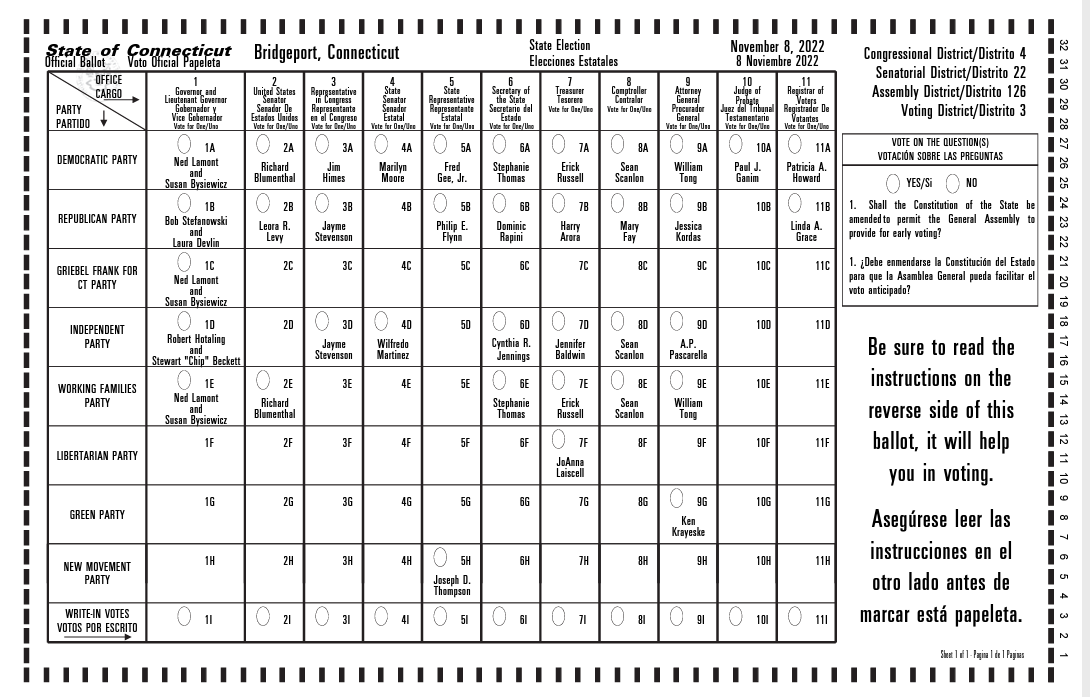
Sample ballot 126th State House District
Most states allow some form of early voting separate from excuse-only absentee voting as is the case in Connecticut.
On Nov. 8, Connecticut electors will decide yes or no to the following question: Shall the Constitution of the State be amended to permit the General Assembly to provide for early voting?
This initiative is led by the Democratic-controlled legislature while many Republicans lean puritanical to the measure.
The question has received little attention from advocacy groups, either for or against.

Supporters of the question view narrow ballot access as a form of voter suppression leading Bridgeport campaign operatives, for example, to place a premium on harvesting absentee ballots creating an assortment of legal issues.
Open up the access and you limit the potential for fraud. It also mitigates scare tactics as was the case in the recent State House primary redo between City Councilman Marcus Brown and State Rep. Jack Hennessy.
Knowing its precinct turnout weaknesses, the Hennessy camp dropped lit pieces frightening potential Brown voters about the penalties for absentee ballot fraud which in itself is a form of voter suppression. Connecticut electors are handcuffed by a set of excuses such as illness or being out of town to vote by absentee, one of a few states requiring that.
As it turned out, Hennessy’s campaign did well to harvest absentee ballot voters while Brown shellacked Hennessy with walk-in voters to defeat the incumbent. They will face off again Nov. 8 with Brown as the Democratic standard bearer and Hennessy occupying the Connecticut Working Families Party line.


Lennie: What is the “Inside Pitch” on Mayoral appointments?
What’s the connection in Bridgeport? Between Labor Relations/Personnel/Civil Service/Human Resources and the Number of Grievances, Lawsuits, and other complaints from People on the City payroll?
What is happening with City personnel issues in recent times? Do we still have one person wearing multiple hats for Civil Service, Labor Relations, or other personnel activity? Why? Conflicts of interest that lead to corruption, as we have witnessed, can happen. Who is working with “best practices” in mind?
Has Civil Service process been followed to the letter for new employees in all departments? For employees outside of Civil Service, so called political employees, who are they? What are their titles, and expectations of valuable work product from them by the taxpayers who pay their way? Is this proudly posted on the City site? Why not?
What powers do they have to make employment decisions, supervise workers under Civil Service system, or authorize allocation of resources by the City? Which Council Committee can answer such questions as part of their purpose? Would it help to maintain a line item for City legal expenses paid to the Office of Thomas Bucci regarding disquiet among employees? His latest client, someone hired by the City and gone before 90 days had expired? And a replacement in that “employment zone” who has a history of “corrupt organizational practices? Are we screening the “best and brightest” and who is choosing these folks? Has the Police Department activity merely been a distraction?
Why is a taxpayer contributing to a system that today offers the highest compensation, total cash, and benefits, for work that does not necessarily need a gun, or a college education, but competes for necessary hours for an understaffed Police Department? Review the data that the OPM keeps but is not sharing with the taxpayer. Do the numbers yourself. Time will tell.
John, not sure if any of those questions are on the ballot, but I can answer them, G2. 🙂
That’s the connection. 🙂
Or Pepe Silvia. 🤣
https://www.youtube.com/watch?v=_nTpsv9PNqo